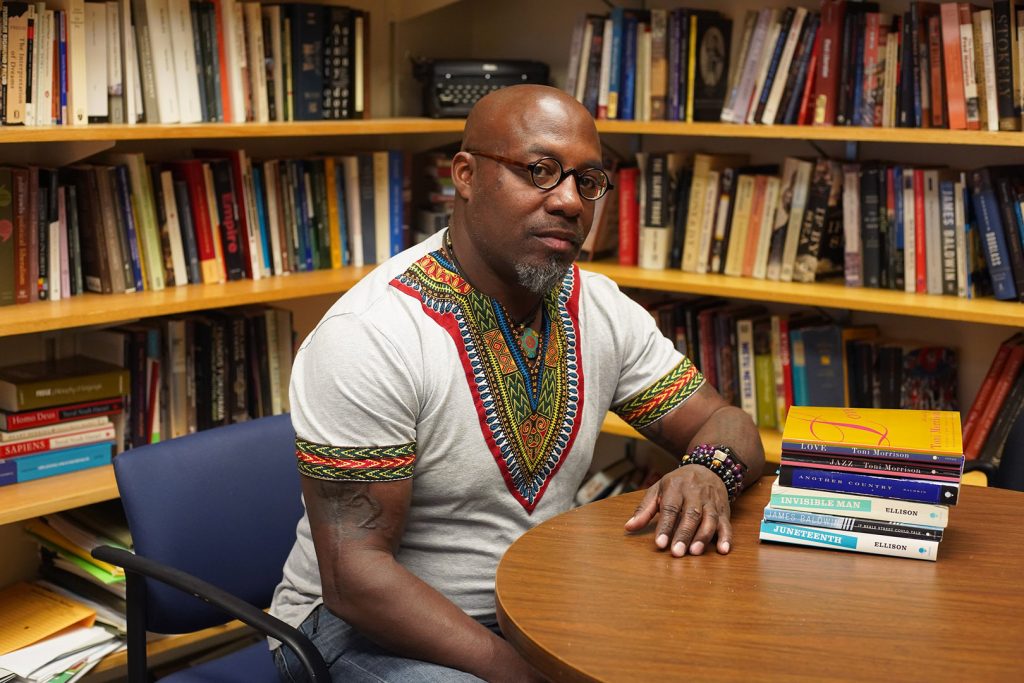Literary Giants, Race, and Protest
The last few months have turned our world upside down and inside out. A global pandemic, a flailing economy, and a generation-defining series of protests against systemic anti-Black racism and police brutality. These are times of world-altering shifts.
During times like these, we often turn to art — in particular, to writers — to their worlds, works, and words.
“Books help you take a historical event and put it into the context and experiences of a single person’s life, however fictional that person is. You get to see how systemic racism can shape lives on a microscale,” says Anya Steinberg ’21.
A Summer Session English class taught by Assistant Professor Michael Sawyer, which convened daily via Zoom, read and discussed six major works by iconic Black authors — “Invisible Man” and “Juneteenth” by Ralph Ellison, “If Beale Street Could Talk” and “Another Country” by James Baldwin, and “Jazz “and “Love” by Toni Morrison.
Sawyer explains that the contemporary relevance of these works and words, in light of the resurfacing of anti-Black racism and consequential equity-driven protest, creates a “positive impatience, where I want to dig into texts more urgently — martialing that impatience toward discovery.” Sawyer’s scholarship and teaching falls in both the Race, Ethnicity, and Migration Studies and English departments. He is also the founder and director of the Africana Intellectual Project at Colorado College, designed to enable CC and its intellectual community to explore the lives, art, intellect, and culture of people of African descent.
“All of these texts deal with street protest and a response to violence. There’s something about the fluency of three artists articulating issues in vastly different ways — they combine to create a rich environment and a very detailed portrait of these problems,” Sawyer says.
Discussing such important and current topics is a challenge at the best of times. Having to do so via distance classroom spaces brings a new level of challenge to bear on the material and those involved.
“A discussion-based course certainly presents a challenge; our small size has allowed us to have fairly organic, free-flowing discussions,” says Jenna Kalishman ’22.
“Some of the students are literally in the same spaces as the protests and unrest — in Minneapolis, for example — that we’re seeing nationwide,” explains Sawyer. “That immediacy, it gives these works a new perspective.”
Perspective is a key element of the dialogue and investigation of these authors’ works. Ellison, Baldwin, and Morrison are each dealing with confronting racist systems, doing so in their own ways, from their own perspectives. From Ellison’s “Invisible Man,” which Sawyer considers “the greatest Western novel,” to Morrison’s work as “our greatest lyricist,” to Baldwin’s searing prose as “the greatest translator of events” — each brings a different craft as a storyteller to the events of their day, as well as ours.
“They are all incredible, accurate describers of the machines that they’re confronting; white supremacy, patriarchy, homophobia,” says Sawyer.
“Their works, it shows just how much there is in the canon that we’re not immediately familiarized with or told about,” says Michael Gorman ’21. “These authors capture societal dynamics in such unique ways; they each have a different style, but they’re each so smart in how they wrap up other critiques of works and methods.”
Kalishman agrees. “Reading and discussing the texts of some of America’s most influential Black authors has obviously proved relevant to current events. While they haven’t changed my engagement in terms of direct action, these texts have certainly expanded my learning and knowledge.”
That engagement takes many forms, but for some in the class, it’s far more localized than for others.
“I think with or without the authors, I would’ve had a hard time staying unengaged with the current events because I live in Minneapolis,” says Steinberg. Minneapolis is ground zero for the worldwide movement of Black-led and -centered protest and demonstration. On May 25, 2020, George Floyd, a 46-year-old Black man, was killed in Minneapolis during an arrest.
“In each of the books we’ve read, there has been at least a scene or multiple scenes involving police violence. That’s across Ellison, Baldwin, and Morrison. It’s striking to see that this is something the Black community has been grappling with for decades, not just in the past month,” she adds.
